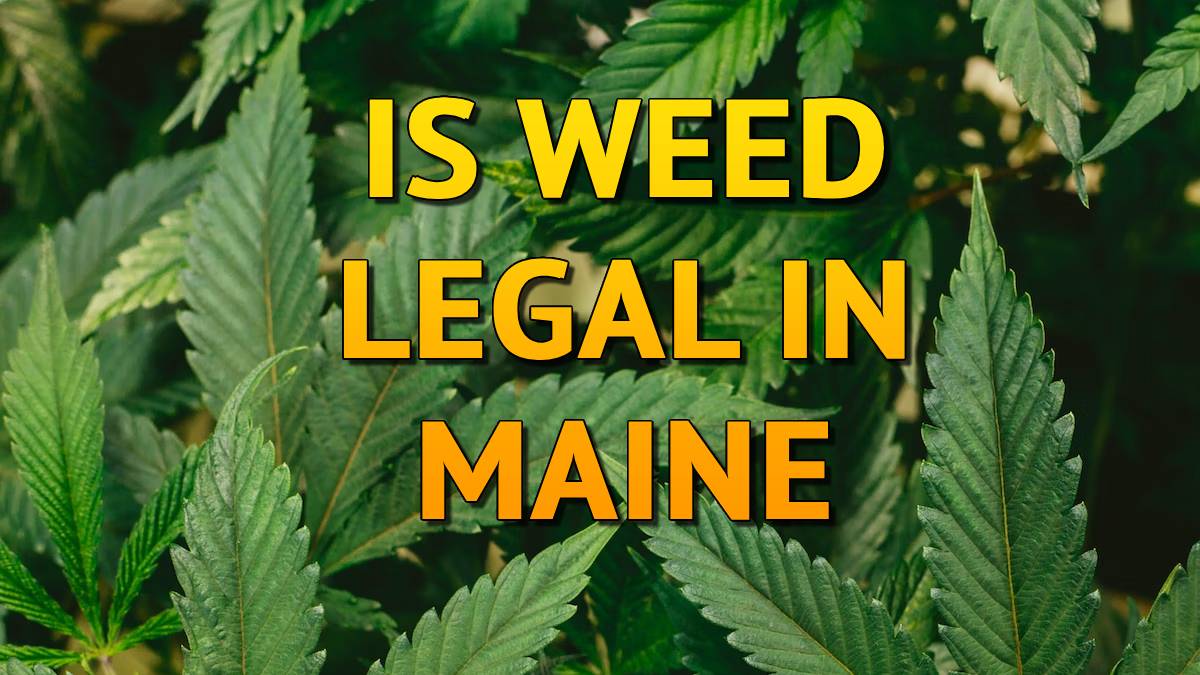Is recreational cannabis legal in Maine? Is medicinal marijuana legal in Maine? What about Maine’s CBD laws? Find out about the weed laws in Maine in this article.
Do you like blueberries? How about lobster? If you like either, or both, Maine is the place for you. Maine produces 90% of the U.S.’s lobster supply, producing 40 million pounds of lobster each year, as well as a whopping 99% of the United States’ blueberry supplies.
Located in the very top right corner of the United States you’ll find the New England state of Maine, home to some of the coldest winters in all of the United States
Maine served as the birthplace of the famous novelist Stephen King and is known for its rugged cliff outcrops and picturesque coastline, with lighthouses and idyllic churches aplenty.
Further mainland, the state becomes something else entirely. Maine has the highest percentage of forestation of any U.S state – approximately 12 million acres. Although sparsely populated, the ecological reserves are brilliant for a hike, particularly in autumn where the deciduous trees put on a show. For those who are interested in water sports, there are multiple rivers which are perfect for kayaking.
To the north, Maine is bordered by the Canadian provinces Quebec and New Brunswick. Perhaps the early legalisation of weed in Canada had an effect on the state of Maine!
Is recreational weed legal in Maine?
Marijuana was originally prohibited in 1913, and it wasn’t until 1976 that possession of small amounts was decriminalised. Much more recently, the possession and recreational use of marijuana was decriminalised in two of the largest cities in Maine – Portland and South Portland – in 2013 and 2014 respectively. This put pressure on state governments to act.
In late 2016, the state government issued a ballot which proposed the statewide legalisation of marijuana use and sale. A ‘Yes’ vote passed by less than one percentage point. By January 2017, the Marijuana Legalisation Act came into effect, permitting adults to grow and possess cannabis for personal use. This act also stipulates a 10% tax on marijuana sales.
Adults in Maine may possess up to 2.5 ounces of marijuana flower or up to the same amount of marijuana flower and concentrate, totalling no more than 5 grams of concentrate. In addition, adults can cultivate up to three flowering marijuana plants, 12 immature plants and unlimited seedlings, and keep all of the marijuana produced.
The cultivation possession limits are far higher than many states in the U.S, and with good reason. Currently in Maine, although there are plenty of medicinal marijuana dispensaries across the state, the government is yet to finalise legislation for retail cannabis stores. That means that at this stage, growing your own is the only legal way to access marijuana in Maine.
In February of 2020, the state was close to issuing the first retail licenses, and retail stores were originally set to open in June this year. The Office of Marijuana Policy has since acknowledged that the current COVID19 situation may delay that date.
Like many states, it is illegal to light up in public areas of Mary-Jane Maine. It is only legal to smoke or use cannabis in a private residence or on private property.
Is medicinal marijuana legal in Maine?
Medicinal marijuana first became legal in Maine in 1999, allowing for the cultivation of plants, but legislation didn’t outline any means for the legal sale of cannabis. It wasn’t until November 2006 that a citizen-initiated bill was voted on and passed – legalising not-for-profit dispensaries which are regulated by the state’s department of health.
There are now a number of registered medicinal marijuana dispensaries along the coast of Maine. Qualifying patients are able to purchase and possess up to 2.5 ounces of flower material and up to six mature plants. Chronic pain, Parkinson’s, PTSD and cancer are covered by the legislation, as are a number of digestive system illnesses, including nausea and inflammatory bowel disease.
Maine also allows medicinal marijuana for those suffering from cachexia, or wasting syndrome. Cachexia is often an additional disease stemming from a chronic illness such as HIV/AIDS. Cannabis use has shown promise as a treatment for cachexia as it can assist in reducing feelings of nausea, and increase appetite.
In addition to the illnesses originally stipulated, an amendment was made in July 2018 to allow any physician to prescribe medicinal marijuana for any patient if they believe it will benefit them.
The cultivation of marijuana plants for medicinal use is reasonably flexible. Those who are growing cannabis plants are legally able to treat as many patients as they can using their harvest and are able to hire employees.
Is CBD legal in Maine?
Luckily for Americans who are interested in all the great health benefits that CBD has to offer, the federal government passed legislation in 2018 which allows for the purchase and possession of CBD products.
These CBD products must have less than 0.3% THC. This means that the products won’t get you high, as they are missing the psychoactive ingredient of cannabis.
So why bother taking it if it won’t get you high? Early studies have shown great promise in the positive effects of CBD without its psychoactive counterpart.
In the world of sports, CBD has been found to reduce pain, increase the quality of sleep (necessary for the body’s muscle repair), reduce inflammation and can be taken effectively as an ingestible oil or topical cream.
A number of high-level athletes have been vocal about their CBD use in their areas, including former NFL line back Ricky Williams, who has since gone on to open his own online store.
Across the country, cafes and bars are adding CBD oils to lattes, cakes and cocktails, making it easy to access a pick-me-up in the middle of the day. In the coming years, we may even see big names like Coca Cola jump on the CBD bandwagon. Heineken is already there – Hi-Fi Hops is available in dispensaries across California.
It’s not just for us though, there are also CBD products for your furry friends. Our endocannabinoid system (ECS) is virtually identical to the ECS found in animals. If you have a pet suffering from inflammation, arthritis or even anxiety, CBD products could be useful for them and you.

